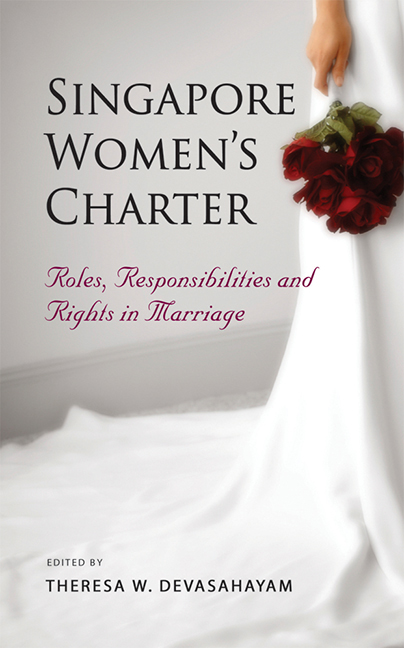Book contents
- Frontmatter
- Contents
- Contributors
- Foreword
- Keynote Address
- 1 Legal Mechanisms for Protecting Women's Rights: Examples from Southeast Asia
- 2 The Women's Charter, 1961: Where We Were Coming From and How We Got There
- 3 Significant Provisions in the Women's Charter
- 4 A Lawyer's Perspective on How Divorcees View the Women's Charter
- 5 “The Morning After”: Understanding and Exploring the Psychosocial Impact of the Women's Charter on Families Experiencing Domestic Violence
- 6 Epilogue: Some Thoughts on Protecting Women's Rights in the Family and Beyond
- Index
4 - A Lawyer's Perspective on How Divorcees View the Women's Charter
Published online by Cambridge University Press: 21 October 2015
- Frontmatter
- Contents
- Contributors
- Foreword
- Keynote Address
- 1 Legal Mechanisms for Protecting Women's Rights: Examples from Southeast Asia
- 2 The Women's Charter, 1961: Where We Were Coming From and How We Got There
- 3 Significant Provisions in the Women's Charter
- 4 A Lawyer's Perspective on How Divorcees View the Women's Charter
- 5 “The Morning After”: Understanding and Exploring the Psychosocial Impact of the Women's Charter on Families Experiencing Domestic Violence
- 6 Epilogue: Some Thoughts on Protecting Women's Rights in the Family and Beyond
- Index
Summary
Introduction
Divorce has increasingly become an inevitable consequence of marriage in many parts of the world. That the incidence of divorce is on the increase worldwide is related to a number of factors. Romantic love — which was commonly thought to dictate the formation of marital unions — is on the demise and has been touted as one reason for the rise in divorce. In this case, once love subsides, divorce is unavoidable (cf. Abbott, Wallace and Tyler 2005). The value placed on individualism, shaping choice, control, and equality is another factor (Beck and Beck-Gernsheim 1995). Other arguments put forward for the increasing rate of divorce include the erosion of the “man as breadwinner” model, owing to cultural changes, and the breaking down of a moral code around marriage, divorce, and cohabitation (Lewis 2001). The erosion of marital commitment owing to dissatisfaction in the relationship has also been found to be a factor leading to divorce, rather than women's economic independence (Sayer and Bianchi 2000).
In almost every country, family laws have incorporated provisions to enable estranged couples to end their unions. In Singapore, the Women's Charter, Chapter 353, is the law that governs divorce of non-Muslims. According to the Women's Charter, “that the marriage has irretrievably broken down”, based on any one of the following five “facts” is the sole cause for divorce (Chan 2008):
(a) That the defendant has committed adultery and the plaintiff finds it intolerable to continue living with the defendant;
(b) That the defendant has behaved unreasonably and the plaintiff cannot be reasonably expected to live with the defendant;
(c) That the plaintiff has been deserted for a continuous period of at least two years prior to filing the writ for divorce;
(d) That the parties have lived apart for a continuous period of at least three years immediately before the filing of the writ for divorce and the defendant consents to the divorce been granted; and,
(e) That the parties have lived apart for a continuous period of at least four years immediately before the filing of the writ for divorce.
- Type
- Chapter
- Information
- Singapore Women's CharterRoles, Responsibilities and Rights in Marriage, pp. 113 - 146Publisher: ISEAS–Yusof Ishak InstitutePrint publication year: 2011

